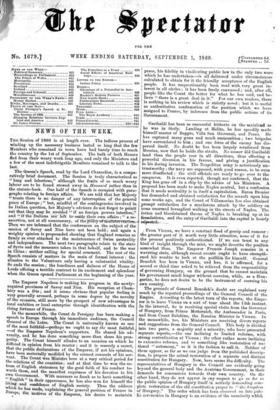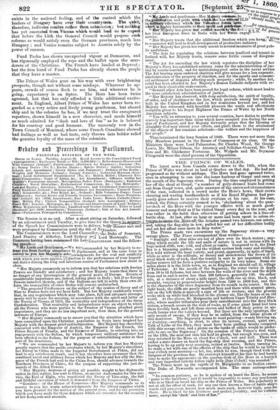, From Vienna, we have a constant flood of gossip
and rumour ; the greater part of it worth very little attention, none of it for the present positively authenticated. If we can trust to any kind of insight through the mist, we might describe the position somewhat thus. The Emperor Francis Joseph remains in a wavering state, although recent events ought to have strength- ened his resolve to look at the pa-Min-for himself. General Benedek has been in Vienna, and has, it is affirmed, for a second or third time asked to be relieved from the responsibility of governing Hungary, on the ground that he cannot maintain his government much longer without coercion, while, as a Hun- garian, he does not desire to be the instrument of coercing his own country.
The grounds of General Benedek's doubt are explained very much by the reported proceedings of the General Council of the Empire. A-3cording to the latest turn of the reports, the Empe- ror is to leave Vienna on a sort of tour about the 15th instant. In the interval, he is receiving special visits from the Governor of Hungary, from Prince Metternich, the Ambassador in Paris, and from Count Balabine, the Russian Minister in Vienna. In the meanwhile, too, his Ministers are receiving divers reports and suggestions from the General Council. This body is divided into two parts, a majority and a minority, who have presented separate reports,—the one inclining to limited reforms, with strong centralization at Vienna ; the other rather more inclining to extensive reforms, and to something like restoration of na- tional " automony," as it is the fashion to call it. Neither of them appear, so far as we can judge from the published descrip- tion, to propose the actual restoration of a separate and distinct constitution for Hungary. Now, here seems the difficulty. The representatives of Hungary in the Council are evidently going beyond the general body and the Austrian Government, in their demands for concessions towards their own country. On the
other hand, they do not appear in any respect to go so far as the public opinion of Hungary itself in actively demanding com-
plete restoration of the old constitution proper to " the kingdom of Hungary." The order which has been observed on into pub- lic eel-monies in Hungary is an evidence of the unanimity which exists in the national feeling, and of the control which the leaders of Hungary have over their coustrymen. The (peftt, therefore, indicates resolve rather than submission; but mothhag has yet emanated from Vienne. whit* ',amid lead us to expel% that before the 15th the General Council would propose such reforms as would satisfy even the German provinces, much less Hungary ; and Venice remains subject to Austria solely by the power of cannon.



























 Previous page
Previous page